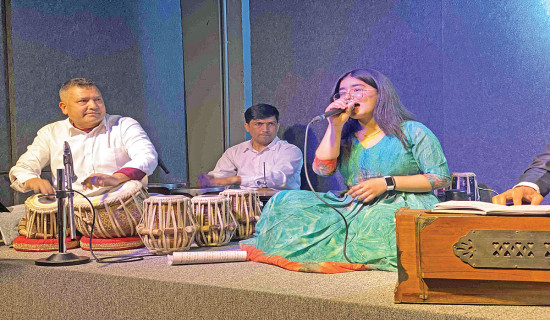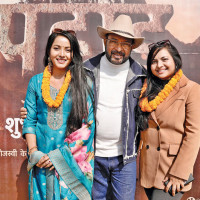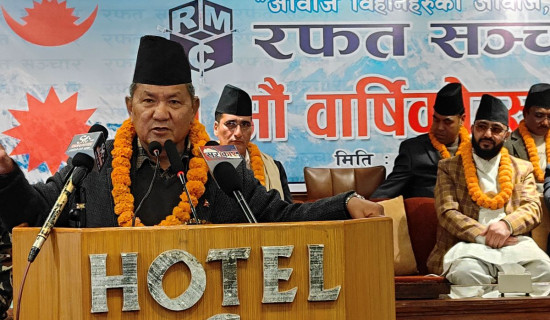- Wednesday, 5 February 2025
Hareram's Dedication To Harmonium
Amid Kathmandu’s bustling Ason area, where narrow streets weave stories of generations, stands an old mud-and-brick house. Inside, a creaky flight of wooden stairs leads to a workshop filled with wooden parts, reed keys, and fragments of harmoniums. It is here, amidst this ordered chaos, that Hareram Shah can be found repairing and making harmoniums, a passion that defines him.
Born in Mahottari district in 1961, Shah reflects on his humble beginnings. "I don’t remember the month, but I know I was born on a Thursday," he says with a smile. His journey began in the small village, where simplicity and hard work were the essence of daily life. At the age of 15, Shah moved to Kathmandu with his father, Shree Kisan Thaka Shah, seeking better opportunities. The move was anything but easy. Language barriers, homelessness, and the overwhelming pace of city life tested their resilience. "We spent a few nights in Kalimati before staying with Kedar Wastaj, a pioneer tabla player. His daughter-in-law was from Dhanusha district, and my father knew him. We stayed at his house for a year, repairing his instruments and those of his friends. Later, he introduced us to Mohan Kaji, who lived in Ason and needed his harmonium repaired. That’s when our lives began to change," Shah recalls.
It was through Mohan Kaji that Shah and his father discovered their calling. "We started by repairing Mohan Kaji’s harmonium," Shah explains. Ason, renowned for its Dafa Bhajans, became a fertile ground for their craft.
Shah shares that Kaji used to sing Dafa Bhajan, a traditional Newari devotional singing practice in Nepal, performed in temples and gatherings, preserving the nation's rich musical and spiritual heritage in Ason. Shah’s voice joined the Bhajans for over a decade, creating connections that brought a steady flow of work.
In 1978, Shah and his father rented a shop in Ason for Rs. 150, transforming the small space into a haven for musicians and their cherished instruments. Under his father’s guidance, Shah mastered the intricate art of harmonium repair. "Everything was handmade back then. Materials had to be sourced from India since they weren’t available locally. Even today, while some parts are ready-made, much of the work remains labour-intensive," he says. Despite the challenges, Shah’s dedication to the craft never wavered.
Harmoniums are central to Nepal’s musical traditions, commonly used in devotional, classical, and folk music. Their rich, melodic sound complements Bhajans, folk songs, and modern music. Often used in temples and during festivals, they have become symbols of devotion and artistry, bridging traditional and contemporary music forms, a legacy Shah safeguards in his workshop. "Each harmonium has its own story," he shares. Recently, a flood-damaged harmonium arrived at his workshop. "It was in terrible condition, but I had to repair it. It took 12 days, but seeing it restored and being connected with its owner was worth every moment," Shah says.
The art of harmonium repair demands precision and patience. "Every part, from the reeds to the bellows, requires careful attention. Tuning the reeds is especially delicate; even the smallest misstep can ruin the melody. It’s not just a skill but a heartfelt practice," Shah explains. He also crafts new harmoniums, which he finds easier than repairs. "I can make 8 to 10 new harmoniums in a month. Repairs, however, take more time as you need to first understand the damage," he says. Prices for new harmoniums range from Rs. 18,000 to Rs. 40,000, while repair costs vary between Rs. 500 and Rs. 10,000.
Over the decades, Shah has earned the trust of clients across Nepal and even from India. "More than money, I value the satisfaction of my customers," he says. His work has supported his family of five. Shah got married to Sunaina Devi a year before leaving Mahottari. “Sunaina came from Sarlahi, and our families arranged the marriage,” Shah recalls. “Back then, love marriages weren’t really an option.” For the initial five years of their marriage, Sunaina remained with her family, following a local custom in the Tarai region, where a bride doesn’t move in with her husband until she’s of age. This period coincided with Hareram’s relocation to Kathmandu.
At present, one of his sons is pursuing education in the USA, while another son is also in the process of studying abroad. His daughter is studying for a master’s degree in Nepal. However, Shah remains deeply rooted in his homeland. "This is the land where I learnt my skills, which I am passionate about and gives me peace. Additionally, it is the land of Lord Pashupatinath. I have dedicated my life to my work and to Lord Pashupatinath, and I want to spend my life here," he says with quiet poise.
To Shah, harmoniums are not just instruments; they are living entities with souls waiting to be revived. "Music connects me to the divine. When I repair or play a harmonium, it feels like meditation and peace," he reflects. His day begins at 5 am with musical practice, a ritual that energises him for the hours ahead. His wife, equally devoted to their shared passion, works alongside him in the workshop. Together, they have trained others, expanding their craft into a small yet thriving business that employs three craftsmen.
Their workshop has become a cultural hub, serving renowned musicians like Ustad Ghulam Ali, Amber Gurung, Anil Shahi, and many more. He believes his unique combination of technical know-how and musical insight is what enables him to produce such high-quality repairs, which is why his customers trust him with their harmoniums.
“Repairing a harmonium isn’t easy,” he says. “It takes more than just technical ability; one also needs to have a solid understanding of music. The tuning is essential. I can tune any harmonium perfectly. While digital tuning devices exist today, I still prefer doing it by hand.”
Hareram fondly remembers when the legendary Indian musician Ghulam Ali visited Nepal in 1947 and complimented him on his impeccable repair work on his harmonium.
He also recalls an encounter with Amber Gurung. "He once called me to his home, but I couldn’t make it. He joked that I’d become a true businessman. When I was younger, I would visit clients. Age makes such visits harder now,” he says with a laugh.
For Shah, the harmonium is more than wood and reeds; it is a vessel of emotion. "The harmonium is like a river, flowing and adapting to the musician’s touch. Its reeds resonate like heartstrings," he muses. This deep connection to his craft has endeared him to generations of musicians.
At 63, Shah works tirelessly, from 8 am to 7 pm, seven days a week. "I never feel tired. For me, this work isn’t just about completing tasks or earning a living. It’s where I find peace. It’s like meditation," he says.
(Maharjan is a journalist at The Rising Nepal.)

















